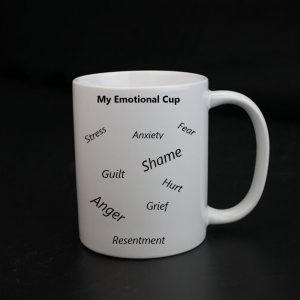How Full Is Your Emotional Cup?
“The straw that broke the camel’s back”.
That time when something small and unimportant sent us into a tirade of uncontrolled emotions, lashing out at everyone around us and leaving us after the fact feeling pretty awful about how we reacted.
It’s not a nice place to be and thanks to the year of 2020, a place I have found myself in far too often.
What causes this and is there anything we can do about it?
In my work, I train executives and their staff how stress impacts our brain and behaviour. Our reptilian brain sending us into ‘flight or fight’ mode and produces our less than helpful emotions like frustration, anger and even aggression.
Our brain is wired to survive, everything it does is processing for signs of danger and in this complex world that we live in that is no easy task.
More often than not the danger is not real, it is perceived. It is the mind making up lots of worst-case scenarios between now and a time in the future so that you can make ‘educated’ decisions now to avoid those bad outcomes.
The problem is that many of us can’t control those thoughts. Our brain is telling us stories regarding our possible future that keep us in the place of fight or flight, in that stressed place. Our brain produces unhelpful emotions until that we can no longer hold them in. They have only one place to go and that is out and through an emotional release, an outburst or a tirade.
 In my workshops I use the metaphor of the emotional cup to explain this stress overload .
In my workshops I use the metaphor of the emotional cup to explain this stress overload .
We all have one of these emotional cups. Each of us has a unique cup, different in size and shape with the ability to hold a certain amount of emotional energy.
Some of us fill our cups up really quickly, either because they produce lots of emotions or because their cup is small and cannot hold much. The latter we might refer to as people with ‘a short fuse’.
Before you read on, ask yourself “What size is my emotional cup, what does it look like?”.
In your mind now you may be visualising a coffee mug, wine glass or a jug. Although it is just a metaphor, it helps the mind present you with an accurate representation of how much emotional energy you can hold before you lose it.
As a leader it is important to be aware of your own emotions and the triggers, events or scenarios that fill your emotional cup the most.
Leaders can’t lead effectively if they are emotionally full.
They can’t support others or be their best version of themselves if they are emotionally full.
There are many ways that your cup can be filled, generally it is anything that produces an unhelpful emotion.
Here are some of the more common ones we may be faced with on a daily basis:
- Someone doing or saying something that goes against your own values
- Somebody telling you that the job you did was wrong or sub-standard
- Workload is too much for the time you have been given to do it.
- The demands of others seeking your help stops you doing your own work
- Your leader or any of your colleagues being in a bad or aggressive mood
- Being late to start work
- Trying to get the kids out the door for school on time
- Your car will not start
This list can go on and on, but hopefully you get the idea. If you experience multiple events each day, it can be quite easy to have your cup overflow and igniting that proverbial fuse.
If the emotional cup is always being filled, how can it be emptied? Or are people with bigger cups just less volatile?
The good news is that you can empty your cup. There are several ways to keep emptying those cups and here are some that have worked well for my clients and myself.
The best way to empty your cup completely is to say what is on your mind. If you have a problem that is eating at you then get it out.
If that means a rigorous or passionate debate comes from this then so be it.
Let it flow but remember, in the heat of the moment to avoid using personal statements and judgements. That will only fill the other person’s emotional cup and potentially put them in to a defensive place where they will either lash out or shut down.
Sharing your feelings with others empties your cup really quick, but this is harder for some and easy for others.
Using phrases like “I didn’t like doing that job it made me feel…” or “I don’t like your tone, it makes me feel…” or “the kids at home are driving me mad, I feel like…” could be really helpful. Every time you have a conversation where your use the words “I feel like” you are effectively emptying your cup.
Finally, meditation can be really helpful to empty your emotional cup. Metaphors are powerful, so now you can use that metaphor and actually clean the cup.
Meditation may be a new thing to try for some of you. In my personal meditation, I wash my cup in a stream that runs through an open forest, where I feel most calm. It does not matter what you do as long as you can visualise washing the cup out.
Leaders can only be their best version of themselves when their emotional cup is as empty as possible, so that you can deal with whatever the day throws at you.